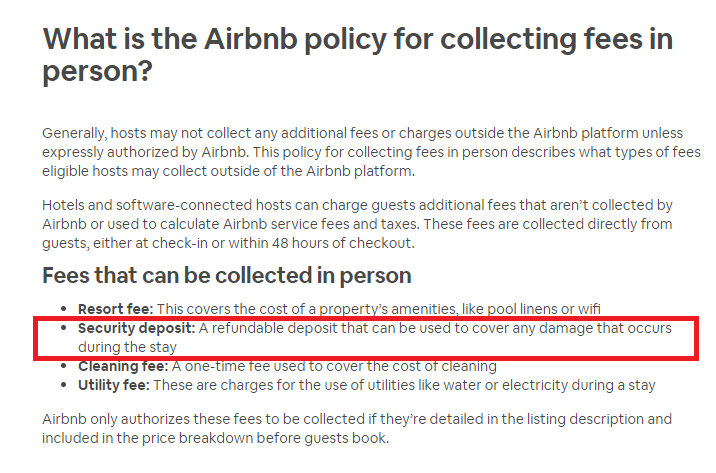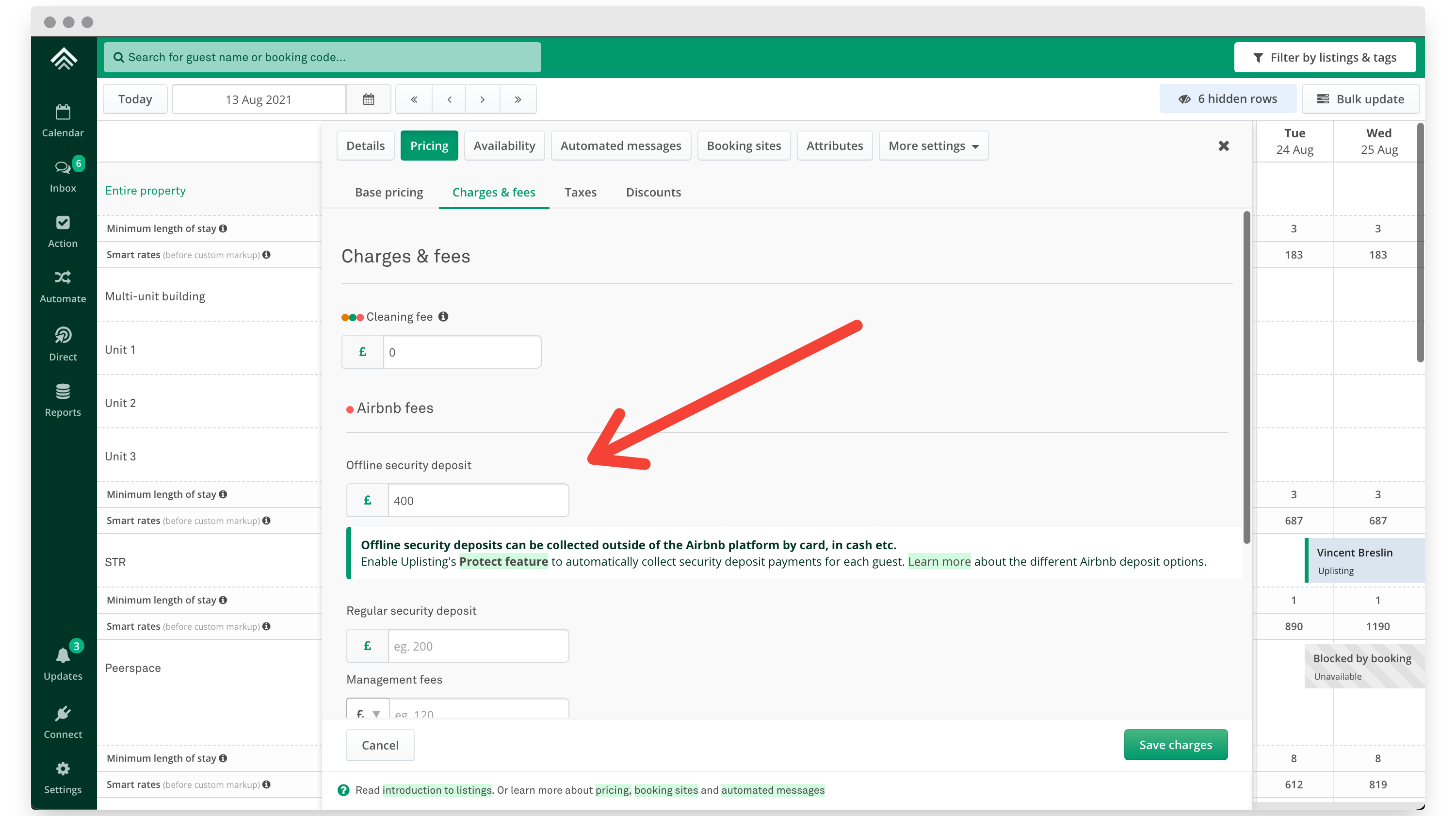Airbnb does not have an explicit security deposit policy and does not require hosts to charge it. However, hosts can request a security deposit through the Airbnb platform when guests make their initial payment.
This provides an additional layer of protection for hosts in case of property damage or rule violations. As an Airbnb host, you may have questions about security deposits and how they work. Understanding the ins and outs of Airbnb security deposits is crucial for protecting your property and ensuring a positive hosting experience.
We will explore the details of Airbnb’s security deposit policy, how it works, and whether it’s a recommended practice for hosts. By the end, you will have a clear understanding of how to approach security deposits as an Airbnb host.
Contents
- 1 Introduction To Airbnb Security Deposits
- 2 Airbnb’s Policies On Security Deposits
- 3 Setting Up A Security Deposit For Your Airbnb
- 4 Pros And Cons Of Charging A Security Deposit
- 5 Handling Security Deposit Disputes
- 6 Security Deposit Alternatives
- 7 Legal Considerations For Airbnb Hosts
- 8 Real Host Experiences With Security Deposits
- 9 The Future Of Airbnb Security Deposits
- 10 Frequently Asked Questions
- 11 Conclusion
Introduction To Airbnb Security Deposits
Airbnb hosts have the option to request a security deposit from guests, although it is not a requirement by the platform. The deposit amount is not charged in advance, but rather unavailable for guests to use during their stay in case of damages.
Hosts can inform guests of their policy and charge them when they make their initial payment.
The Basics Of Security Deposits
In the world of Airbnb hosting, security deposits play a crucial role in ensuring the protection of both hosts and guests. A security deposit is a monetary amount set by the host to cover any potential damages or violations of the rental agreement during a guest’s stay. It serves as a form of insurance, giving hosts peace of mind and a means to recover any losses.
Common Misconceptions
There are a few common misconceptions surrounding Airbnb security deposits that are important to clarify. Firstly, it’s important to note that Airbnb does not have an explicit security deposit policy. While hosts have the option to request a security deposit from guests, it is not a requirement set by the platform.
Secondly, hosts cannot charge guests a security deposit through Airbnb’s Resolution Centre or outside of the platform. Instead, hosts can inform guests of their security deposit policy and charge them accordingly when they make the initial payment. This ensures transparency and adherence to Airbnb’s guidelines.
Thirdly, it’s crucial to understand that the security deposit amount is not charged in advance like a traditional security deposit. Rather, the amount is simply unavailable for guests to use during their stay. It serves as a temporary hold to cover any potential damages or violations.
Lastly, it’s worth noting that security deposits are refundable if the property remains undamaged throughout the guest’s stay. Hosts have the option to set up security deposits to cover minor damages, providing an extra layer of protection.
In conclusion, Airbnb security deposits are an important aspect of the hosting process. While not mandatory, they provide hosts with a sense of security and a means to recover losses in case of damages. By understanding the basics of security deposits and debunking common misconceptions, hosts can effectively protect their property and provide a safe and enjoyable experience for their guests.
Airbnb’s Policies On Security Deposits
Airbnb’s Policies on Security Deposits:
Hosts And Security Deposit Requests
Hosts can request a security deposit from guests, but Airbnb doesn’t mandate it.
Understanding Guest Charges
Guests aren’t charged upfront for security deposits; the amount is held during their stay.
Setting Up A Security Deposit For Your Airbnb
As an Airbnb host, setting up a security deposit can provide you with a layer of protection in case of property damage or other issues during a guest’s stay. Implementing a security deposit is an important step in safeguarding your property and ensuring a positive hosting experience for both you and your guests.
Steps To Implement A Deposit
When setting up a security deposit for your Airbnb listing, follow these steps:
- Create a clear policy: Clearly outline the security deposit amount and terms in your listing description.
- Enable the security deposit feature: Navigate to your Airbnb host dashboard and enable the security deposit option for your listing.
- Specify deposit amount: Set the amount of the security deposit, taking into consideration the value of your property and potential damages.
- Communicate with guests: Clearly communicate the security deposit policy to potential guests before they book your property.
- Document any damages: Take photos or videos of your property before and after each guest’s stay to document any damages.
Communicating With Guests
Effective communication with your guests regarding the security deposit is crucial. Here are some tips for communicating with guests about the security deposit:
- Include details in your house rules: Clearly state the security deposit policy in your house rules section.
- Answer guest inquiries: Be prepared to address any questions or concerns guests may have about the security deposit.
- Provide reassurance: Communicate to guests that the security deposit is a standard procedure and is aimed at protecting both parties.
- Use messaging templates: Utilize Airbnb’s messaging templates to ensure consistency in communicating the security deposit policy to all guests.

Credit: airhostsforum.com
Pros And Cons Of Charging A Security Deposit
When considering whether to charge a security deposit as an Airbnb host, it’s essential to weigh the advantages and drawbacks of this practice. Here, we explore the benefits for hosts and potential guest deterrents.
Benefits For Hosts
- Protection against damages to the property
- Financial security in case of unexpected incidents
- Encourages guests to be more careful during their stay
- Potential to cover cleaning or repair costs
Potential Guest Deterrents
- May discourage budget-conscious travelers
- Guests may perceive it as an extra cost or inconvenience
- Could lead to longer booking decision-making process
- Risk of negative reviews if disputes arise over deposit deductions
Handling Security Deposit Disputes
In handling security deposit disputes as an Airbnb host, it’s essential to communicate your policy clearly to guests upfront. Clearly outline any charges for damages and ensure transparency throughout the booking process to avoid conflicts later on. This proactive approach can help prevent misunderstandings and facilitate smooth resolutions if issues arise.
Handling Security Deposit DisputesAs an Airbnb host, it’s important to understand how security deposits work and what to do in case of a dispute. While security deposits are not required by Airbnb, many hosts choose to set them up as a way to protect their property.Resolution Center ProtocolsIf a guest damages your property or violates your house rules, you can file a claim through Airbnb’s Resolution Center. This is a platform that allows hosts and guests to communicate and resolve issues with the help of Airbnb’s support team.When filing a claim, be sure to provide clear evidence of the damage or violation. This can include photos, receipts, or messages between you and the guest. Once a claim is filed, Airbnb will review the evidence and make a decision on how to proceed.Best Practices for HostsTo avoid disputes over security deposits, it’s important to communicate your policies clearly to guests. Make sure your house rules are clearly stated in your listing and that guests are aware of any security deposit requirements before booking.Here are some best practices to follow:– Clearly state your security deposit policy in your listing and in your communication with guests. – Take photos of your property before and after each stay to document any damage. – Communicate openly and promptly with guests if there is an issue with your property. – If a guest violates your house rules or damages your property, file a claim through the Resolution Center as soon as possible.By following these best practices, you can help prevent disputes over security deposits and ensure a positive experience for both you and your guests.In conclusion, understanding how to handle security deposit disputes is an important aspect of being an Airbnb host. By familiarizing yourself with Airbnb’s Resolution Center protocols and following best practices for hosts, you can help protect your property and avoid conflicts with guests.
Credit: support.uplisting.io
Security Deposit Alternatives
When it comes to renting out your property on Airbnb, you want to ensure that your investment is protected. While traditional security deposits are a common way to mitigate the risk of property damage, there are alternative options that can provide similar protection without requiring guests to pay a substantial upfront fee. Let’s explore some of the security deposit alternatives that Airbnb hosts can consider.
Insurance Options
Instead of relying solely on a security deposit, Airbnb hosts can explore insurance options to safeguard their property. Hosts can opt for short-term rental insurance policies that specifically cover any potential damages caused by guests during their stay. These policies are designed to provide financial protection in the event of property damage, offering peace of mind to hosts without imposing a hefty security deposit on guests.
Damage Waivers
Another alternative to a traditional security deposit is to implement damage waivers. Hosts can partner with companies that offer damage waiver programs, which allow hosts to transfer the risk of property damage to the waiver provider. In the event of damage, the waiver provider covers the costs, sparing guests from a substantial upfront deposit while still ensuring that hosts are protected against potential financial losses.
Legal Considerations For Airbnb Hosts
Airbnb hosts need to be aware of the legal aspects surrounding security deposits to protect their property and ensure a smooth hosting experience. Understanding local laws and regulations, as well as adhering to fair practice guidelines, is crucial for hosts.
Local Laws And Regulations
- Check local rental laws and regulations regarding security deposits.
- Ensure that your security deposit amount complies with legal limits.
- Consult with legal professionals for guidance on local hosting laws.
Fair Practice Guidelines
- Clearly outline your security deposit policy in your Airbnb listing.
- Charge the security deposit as a separate line item in your pricing.
- Provide guests with a detailed explanation of how the security deposit works.
Real Host Experiences With Security Deposits
Real host experiences with security deposits on Airbnb can vary. Some hosts choose to request a security deposit through the platform, while others inform guests of their policy and charge only if damage occurs during the stay. Airbnb’s security deposit system holds the deposit amount but doesn’t charge guests upfront, ensuring protection for hosts.
Success Stories
Hosts share their positive experiences with Airbnb security deposits:
- Guests respected property and left it in good condition
- Host received full security deposit refund without any issues
- Security deposit acted as a deterrent for potential damages
Challenges Faced
Hosts recount their challenges with Airbnb security deposits:
- Guest caused damage beyond security deposit amount
- Difficulty in proving damage to Airbnb support
- Delays in receiving security deposit refunds
The Future Of Airbnb Security Deposits
Platform Updates
In response to the evolving landscape of short-term rentals, Airbnb has introduced significant updates to its security deposit policy. Hosts now have the flexibility to set security deposit amounts and request them from guests as a payment. This gives hosts greater control over potential damages and instills a sense of security for both parties.
Trends In Hosting
Hosts are increasingly opting to implement security deposits due to the potential risks associated with short-term rentals. This trend reflects a growing awareness of the importance of protecting their properties and assets. The increasing popularity of security deposits signifies a shift towards more secure and responsible hosting practices within the Airbnb community.

Credit: community.withairbnb.com
Frequently Asked Questions
Is It Normal For An Airbnb Host To Ask For A Security Deposit?
It is not uncommon for Airbnb hosts to ask for a security deposit, although it is not required by Airbnb.
How Does An Airbnb Security Deposit Work?
An Airbnb security deposit works by allowing hosts to request a payment for potential damages. The guest is not charged in advance; instead, the deposit amount is temporarily unavailable for their use during their stay. Airbnb does not require hosts to charge a security deposit, but they can inform guests of their policy and charge them when they make their initial payment.
Can Airbnb Owners Ask For A Deposit?
Airbnb owners can ask for a security deposit, but it is not required by Airbnb and there is no explicit policy regarding it. Hosts can inform guests of their policy and charge them when they make the initial payment. However, hosts are not allowed to charge guests a security deposit outside of the Airbnb platform.
Does Airbnb Put A Hold On Your Card?
Yes, Airbnb may place a hold on your card for the security deposit, but it is not a charge. The security deposit amount is just unavailable for you to use during your stay, and it will be refunded if there is no damage to the property.
Hosts can inform guests of their policy and charge them when they make the initial payment, rather than requesting a separate payment for the security deposit.
Conclusion
To sum up, while Airbnb does not have a specific policy on security deposits, hosts have the option to request one from their guests. It is up to the host to decide whether or not to charge a security deposit, but they must inform their guests of their policy beforehand.
The security deposit is meant to cover any damages caused by the guests during their stay, and is refundable if no damages occur. As a guest, it is important to understand the host’s policy on security deposits before booking to avoid any surprises or misunderstandings.



